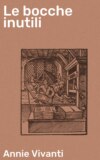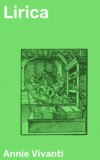Buch lesen: «The Devourers»
PREFACE
There was a man, and he had a canary. He said, "What a dear little canary! I wish it were an eagle." God said to him: "If you give your heart to it to feed on, it will become an eagle." So the man gave his heart to it to feed on. And it became an eagle, and plucked his eyes out.
There was a woman, and she had a kitten. She said: "What a dear little kitten! I wish it were a tiger." God said to her: "If you give your life's blood to it to drink, it will become a tiger." So the woman gave her life's blood to it to drink. And it became a tiger, and tore her to pieces.
There was a man and a woman, and they had a child. They said: "What a dear little child! We wish it were a genius." …
BOOK I
I-I
The baby opened its eyes and said: "I am hungry."
Nothing moved in the silent, shadowy room, and the baby repeated its brief inarticulate cry. There were hurrying footsteps; light arms raised it, and a laughing voice soothed it with senseless, sweet-sounding words. Then its cheek was laid on a cool young breast, and all was tepid tenderness and mild delight. Soon, on the wave of a light-swinging breath, it drooped into sleep again.
Edith Avory had hurried home across the meadow from the children's party at the vicarage, her pendant plaits flying, her straw hat aslant, and now she entered the dining-room of the Grey House fluttered and breathless.
"Have they come?" she asked of Florence, who was laying the cloth for tea.
"Yes, dear," answered the maid.
"Where are they? Where is the baby?" and, without waiting for an answer, the child ran out of the room and helter-skeltered upstairs.
In front of the nursery she stopped. It was her own room, but through the closed door she had heard a weak, shrill cry that plucked at her heart. Slowly she opened the door, then paused on the threshold, startled and disappointed.
Near the window, gazing out across the verdant Hertfordshire fields, sat a large, square-faced woman in pink print, and on her lap, face downward, wrapped in flannel, lay a baby. The nurse was slapping it on the back with quick, regular pats. Edith saw the soles of two little red feet, and at the other end a small, oblong head, covered with soft black hair.
"Oh dear!" said Edith. "Is that the baby?"
"Please shut the door, miss," said the nurse.
"I thought babies had yellow hair, with long muslin dresses and blue bows," faltered Edith.
The square-faced nurse did not answer, but continued pat—pat—pat with her large hand on the small round back.
Edith stepped a little nearer. "Why do you do that?" she asked.
The woman looked the little girl up and down before she answered. Then she said, "Wind," and went on patting.
Edith wondered what that meant. Did it refer to the weather? or was it, perhaps, a slangy servant's way of saying, "Leave me alone" or "Hold your tongue"?
"Has the baby's mother come too?" she asked.
"Yes," said the nurse; "and when you go out, will you please shut the door behind you?"
Edith did so.
She heard voices in her mother's room, and looked in. Sitting near her mother on the sofa was a girl dressed in black, with black hair, like the baby's. She was crying bitterly into a small black-edged handkerchief.
"Oh, Edith dear," said her mother, "that's right! Come here. This is your sister Valeria. Kiss her, and tell her not to cry."
"But where is the baby's mother?" said Edith, glad to gain time before kissing the wet, unknown face.
The girl in mourning lifted her eyes, dark and swimming, from the handkerchief. "It is me," she said, with a swift, shining smile, and one of her tears rolled into a dimple and stopped there. "What a dear little girl for my baby to play with!" she added, and kissed Edith on both cheeks.
"That size baby cannot play," said Edith, drying her face with the back of her hand. "And the woman was hitting it!"
"Hitting it!" cried the girl in black, jumping up.
"Hitting it!" cried Edith's mother.
And they both hurried out.
Edith, left alone, looked round the familiar room. On her mother's bed lay a little flannel blanket like the one the baby was wearing, and a baby's cap, and some knitted socks, and a rubber rattle. On a chair was a black jacket and a hat trimmed with crape and dull black cherries. Edith squeezed one of the cherries, which broke stickily. Then she went to the looking-glass and tried the hat on. Her long small face looked back at her gravely under the caliginous head-dress, as she shook her head from side to side, to make it totter and tilt. "When I am a widow I shall wear a thing like this," she said to herself, and then dropped it from her head upon the chair. She quickly squeezed another cherry, and went out to look at the baby.
It was in the nursery in its grandmother's arms, being danced up and down; its fist was in its mouth, and its large eyes stared at nothing. Its mother, the girl in black, was on her knees before it, clapping her hands and saying: "Cara! Cara! Cara! Bella! Bella! Bella!" Wilson, the nurse, with her back to them, was emptying Edith's chest of drawers, and putting all Edith's things neatly folded upon the table, ready to be taken to a little room upstairs that was henceforth to be hers. For the baby needed Edith's room.
The little girl soon tired of looking, and went down to the garden. Passing the verandah, she could hear the gardener laughing and talking with Florence. He was saying:
"Now, of course, Miss Edith's nose is quite put out of joint."
Florence said: "I'm afraid so, poor lamb!"
Edith ran to the shrubbery, and put her hand to her nose. It did not hurt her; it felt much the same as usual. Still, she was anxious and vaguely disturbed. "I must tell the Brown boy," she said, and went to the kitchen-garden to look for him.
There he was, on his knees, patting mould round the strawberry-plants; a good deal of earth was on his face and in his rusty hair.
"Good-evening," said Edith, stopping near him, with her hands behind her.
"Hullo!" said the gardener's boy, looking up.
"They've come," said Edith.
"Have they?" and Jim Brown sat back on his heels and cleaned his fingers on his trousers.
"The baby is black," said Edith.
"Sakes alive!" said Jim, opening large light eyes that seemed to have dropped into his face by mistake.
"It has got black hair," continued Edith, "and a red face."
"Oh, Miss Edith, you are a goose!" said the Brown boy. "That's all right. I thought you meant it was all black, because of its mother being a foreigner."
Edith shook her head. "It's not all right. Babies should have golden hair."
"What is the mother like?" asked Jim.
"She's black, too; and the nurse is horrid. And what is the matter with my nose?"
"Eh?" said Jim Brown.
"Yes. Look at my nose. What's wrong with it?"
The Brown boy looked at it. Then he looked closer. Little by little an expression of horror came over his face. "Oh!" he exclaimed. "Oh my! Just think of it!"
"What? What is it?" cried Edith. "It was all right just now." And as the boy kept staring at her nose with growing amazement, she screamed: "Tell me what it is! Tell me, or I'll hit you!"
Then the Brown boy got up and danced round her in a frenzy of horror at what was the matter with her nose; so she took a small stone and threw it at him. Whereupon he went back to his strawberry-plants, and declined to speak to her any more.
When he saw her walking forlornly away with her hand to her nose, and her two plaits dangling despondently behind, he felt sorry, and called her back.
"I was only larking, Miss Edith. Your nose is all right." So she was comforted, and sat down on the grass to talk to him.
"Valeria speaks Italian to the baby, and they have come to stay always," she said. "The baby is going to have my room, and I am going to be upstairs near Florence. We are all going to dress in black, because of my brother Tom having died. And mamma has been crying about it for the last four days. And that baby is my niece."
"Your brother, Master Tom, was the favourite with them all, wasn't he?" said Jim.
"Oh, yes," said Edith. "There were so many of us that, of course, the middle ones were liked best."
"I don't quite see that," said Jim.
"Oh, well," explained Edith, "I suppose they were tired of the old ones, and did not want the new ones, so that's why. Anyhow," she added, "it doesn't matter. They're all dead now."
Then she helped him with the strawberry-plants until it was time for tea.
Her grandfather came to call her in—a tall, stately figure, shuffling slowly down the gravel path. Edith ran to meet him, and put her warm fingers into his cool, shrivelled hand. Together they walked towards the house.
"Have you seen them, grandpapa?" she asked, curvetting round him, as he proceeded at gentle pace across the lawn.
"Seen whom, my dear?" asked the old gentleman.
"Valeria and the baby."
"What baby?" said the grandfather, stopping to rest and listen.
"Why, Tom's baby, grandpapa," said Edith. "You know—the baby of Tom who is dead. It has come to stay here with its mother and nurse. Her name is Wilson."
"Dear me!" said the grandfather, and walked on a few steps.
Then he paused again. "So Tom is dead."
"Oh, you knew that long ago. I told you so."
"So you did," said the old gentleman. He took off his skullcap, and passed his hand over his soft white hair. "Which Tom is that—my son Tom or his son Tom?"
"Both Toms," said Edith. "They're both dead. One died four days ago, and the other died six years ago, and you oughtn't to mix them up like that. One was my papa and your son, and the other was his son and the baby's papa. Now don't forget that again."
"No, my dear," said the grandfather. Then, after a while: "And you say his name is Wilson?"
"Whose name?" exclaimed Edith.
"Why, my dear, how should I know?" said the grandfather.
Then Edith laughed, and the old gentleman laughed with her.
"Never mind," said Edith. "Come in and see the baby—your son Tom's son's baby."
"Your son's Tom's sons," murmured the grandfather, stopping again to think. "Tom's sons your son's Tom's sons … Where do I put in the baby?"
Edith awoke in the middle of the night, listening and alert. "What is that?" she said, sitting up in bed.
Florence's voice came from the adjoining room: "Go to sleep, my lamb. It's only the baby."
"Why does it scream like that?"
"It must have got turned round like," explained Florence sleepily.
"Then why don't they turn it straight again?" asked Edith.
"Oh, Miss Edith," replied Florence impatiently, "do go to sleep. When a baby gets 'turned round,' it means that it sleeps all day and screams all night."
And so it did.
II
A gentle blue February was slipping out when March tore in with screaming winds and rushing rains. He pushed the diffident greenness back, and went whistling rudely across the lands. The chilly drenched season stood still. One morning Spring peeped round the corner and dropped a crocus or two and a primrose or two. She whisked off again, with the wind after her, but looked in later between two showers. And suddenly, one day, there she was, enthroned and garlanded. Frost-spangles melted at her feet, and the larks rose.
Valeria borrowed Edith's garden-hat, tied it under her chin with a black ribbon, and went out into the young sunshine across the fields. Around her was the gloss of recent green, pushing upwards to the immature blue of the sky. And Tom, her husband, was dead.
Tom lay in the dark, away from it all, under it all, in the distant little cemetery of Nervi, where the sea that he loved shone and danced within a stone's-throw of his folded hands.
Tom's folded hands! That was all she could see of him when she closed her eyes and tried to recall him. She could not remember his face. Try as she would, shutting her eyes with concentrated will, the well-known features wavered and slipped away; and nothing remained before her but those dull white hands as she had seen them last—terrible, unapproachable hands!
Were those the hands Tom was so particular about and rather vain of—the hands she had patted and laid her cheek against? Were those hands—fixed, cessated, all-relinquishing—the hands that had painted the Italian landscapes she loved, and the other pictures she hated, because in them all stood Carlotta of Trastevere, rippling-haired, bare, and deliberate? Were those the hands that had rowed her and Uncle Giacomo in the little boat Luisa on the Lake Maggiore?—the hands that had grasped hers suddenly at the Madonna del Monte the day she had put on her light blue dress, with the sailor collar and scarlet tie? She seemed to hear him say, with his droll English accent: "Volete essere sposina mia?" And she had laughed and answered him in the only two English words she knew, and which he himself had taught her across the table d'hôte: "Please! Thank you!" Then they had both laughed, until Zio Giacomo had said that the Madonna would punish them.
The Madonna had punished them. She had struck him down in his twenty-sixth year, a few months after they were married, shattering his youth like a bubble of glass. Valeria had heard him, day after day, night after night, coughing his life away in little hard coughs and clearings of his throat; then in racking paroxysms that left him breathless and spent; then in a loose, easy cough that he scarcely noticed. They had gone from Florence, where it was too windy, to Nervi, where it was too hot; from Nice, where it was too noisy, to Airolo, where it was too dull; then, with a rush of hope, with hurried packing of coats and shawls, of paint brushes and colours, of skates and snowshoes, they had journeyed up to Davos. And there the sun shone, and the baby was born; and Tom Avory went skating and bob-sleighing, and gained six pounds in eight weeks.
Then one day an American woman, whose son was dying, said to Valeria: "It is bad for your baby to stay up here. Send her away, or when she is fifteen she will start coughing too."
"Send her away!" Yes, the baby must be sent away. The deadly swarm of germs from all the stricken lungs seemed to Valeria to envelope her and her child like a cloud—the cloud of death. She could feel it, see it, taste it. The smell of it was on her pillow at night; the sheets and blankets exhaled it; her food was impregnated with it. She herself was full-grown, and strong and sound; but her baby—her fragile, rose-bud baby—was Tom's child, too! All Tom's brothers and sisters, except one little girl called Edith, who was in England, had died in their adolescence—one in Bournemouth; one in Torquay; one in Cannes; one, Tom's favourite sister, Sally, in Nervi—all fleeing from the death they carried within them. Now Davos had saved Tom. But the baby must be sent away.
They consulted three doctors. One said there was no hurry; another said there was no danger; the third said there was no knowing.
Valeria and Tom determined that they would not take risks. One snowy day they travelled down to Landquart. There Tom was to leave them and return to Davos. But the baby was crying, and Valeria was crying; so Tom jumped into the train after them, and said he would see them as far as Zürich, where Uncle Giacomo would be waiting to take them to Italy.
"Then you will be all right, helpless ones," he said, putting his arm round them both, as the little train carried them down towards the mists. And he gave his baby-girl a finger to clutch.
But Tom never reached Zürich. What reached Zürich was stern and awful, with limp, falling limbs and blood-stained mouth. The baby cried, and Valeria cried, and crowds and officials gathered round them. But Tom could help his helpless ones no more.
His will was found in his breast-pocket. "Sposina mia, with all my worldly goods I thee endow. Take our baby to England. Bury me in Nervi, near Sally. I have been very happy.—Tom."
These things Valeria Avory remembered as she walked in the soft English sunshine, crying under Edith's garden-hat. When she reached a little bridge across an angry stream, she leaned over the parapet to look at the water, and the borrowed hat fell off and floated away.
Valeria ran down the bank after it, but it was in midstream, resting lightly against a protruding stone. She threw sticks and pebbles at it, and it moved off and sailed on, with one black ribbon, like a thin arm, stretched behind it. Valeria ran along the sloping bank, sliding on slippery grass and wet stones; and the hat quivered and curtseyed away buoyantly on the miniature waves. When the stream elbowed off towards the wood, the hat bobbed along with it, and so did Valeria. As she and the stream and the hat turned the corner, she heard an exclamation of surprise, and, raising her flushed face, she saw a young man, in grey tweeds, fishing on the other side of the water.
The young man said: "Hang it all! Good-bye, trout!" And Valeria said: "Can you catch my hat?"
He caught it with great difficulty, holding it with the thick end of his rod, and flattering it towards him with patient manœuvres.
"My trout!" he murmured. "I had been after that fat fellow for three days." Then he dragged the large splashing hat out of the water and held it up. "Here's your hat." It had never been a beautiful hat; it was a dreary-looking thing that Edith had had much wear out of. It had not the appearance of a hat worth fishing three days for.
"Oh, thank you so much! How shall I reach it?" said Valeria, extending a small muddy hand from her side of the stream.
"I suppose I must bring it across," said the young man, still holding the dripping adornment at arm's length.
"Oh no!" said Valeria. "Throw it."
The young man laughed, and said: "Don't try to catch! It will give you a cold." He flung the hat across, and it fell flat and sodden at Valeria's feet.
"Oh dear!" she said, picking it up, with puckered brows, while the black tulle ruffles fell from it, soft and soaking. "What shall I do with it now? I can't put it on. And I don't think I can carry it, walking along these slippery banks."
"Well, throw it back again," said the young man, "and I'll carry it for you."
So she threw the heavy melancholy thing at him, and they walked along, with the water between them, smiling at each other. On the bridge they met, and shook hands.
"I am sorry about your fishes," she said.
"My fishes?" He laughed. "Oh, never mind them. I am sorry about your hat." Then, noting the damp ringlets on her forehead and the dimple in her cheek, he added: "What will you put on when you come to-morrow?"
"To-morrow?" she asked, raising simple eyes.
"Yes; will you?" he said, blushing a little, for he was very young. "At this time"—he looked at his watch—"about eleven o'clock?"
Valeria blushed, too—a sudden crimson flush that left her face white and waxen. "Is it eleven o'clock?" she exclaimed. "Are you sure?"
"Yes; what is the matter?"
"The baby!" gasped Valeria. "I had forgotten the baby!" And she turned and ran down the bridge and across the fields, her black gown flying, the wet hat flapping at her side.
She reached home breathless. The nurse was on the verandah, waiting. "Am I late, Wilson?" she panted.
"Yes, madam," said the nurse, with tight and acid lips.
"How is baby?" gasped Valeria.
"The baby," said the woman, gazing at her, sphinx-like and severe, "is hungry."
III
The young man went to fish in the little stream every day, but he only caught his fat trout. The dimpled girl in mourning did not come again. His holiday was ended, and he returned to his rooms in London, but he left a love-letter for Valeria on the bank, pinned to the crumpled black ruffle that had fallen off her hat, and with a stone on it to keep it down.
Valeria found the love-letter. She had stayed indoors a week, repenting. Then Spring and her youth joined hands, and drew her out of doors and across the fields again. She went, blushing and faltering, with a bunch of violets pinned at her belt. No one saw her but a tail-flicking, windy-haired pony in a meadow, who frisked suddenly after her and made her shiver.
Close to the stream her eye caught the tattered black ruffle and the note pinned to it. The young man wrote that his name was Frederick Allen; that he was reading for the Bar and writing for newspapers. He said that she had haunting eyes, and that they would probably never meet again. He wondered whether she had found the baby, and where she had forgotten it, and what baby it was. And she might have turned round just once to wave him farewell! He hoped she would not be displeased if he said that he loved her, and would never forget her. Would she tell him her name? Only her name! Please, please! He was hers in utter devotion, Frederick.
Valeria went back in a dream and looked up the word "haunting" in her English-Italian Dictionary. She did not remember his eyes: they were blue, she thought, or perhaps brown. But his face was clear and sunburnt, and his smooth-parted hair was bright when he took off his hat on the bridge.
She thought she would simply return his letter. Then she decided that she would add a few words of rebuke. Finally one rainy day, when everybody had seemed cross, and Edith had answered rudely, and the baby had screamed for Wilson who was not there, Valeria, with qualms and twinges, took a sheet of paper and wrote her name on it. The paper had a black border. Valeria suddenly fell on her knees and kissed the black border, and prayed that Tom might forgive her. Then she burned it, and went to her baby, who was quarrelling with everything and trying to kill an India-rubber sheep.
Yet one day in April—an April swooning with soft suggestions, urging its own evanescence and the fleeting sweetness of life—Mr. Frederick Allen, in his London lodgings, received two letters instead of one. Hannah, the pert maid who brought them to his room, lingered while he opened them. In the first was a cheque for six guineas from a periodical; in the other was a visiting-card:
VALERIA NINA AVORY.
"Who the dickens …?" he said, turning the card over. "Here!" and he threw it across to Hannah. "Here's a French modiste, or something, if you want falals!"
Then, as he had received six guineas when he had only expected four, he shut up his law-book, pinched Hannah's cheek en passant, and went out for a day up the river with the man next door.
The card was thrown into the coal-box, and the kitchen-maid burnt it. And that is all.
April brought the baby a tooth.
May brought it another tooth, and gave a wave to its hair. June took away its bibs, and gave it a smile with a dimple copied from Valeria's. July brought it short lace frocks and a word or two. August stood it upright and exultant, with its back to the wall; and September sent it tottering and trilling into its mother's arms.
Its name was Giovanna Desiderata Felicita.
"I cannot remember that," said the grandfather. "Call him Tom."
"But, grandpapa, it is a girl," said Edith.
"I know, my dear. You have told me so before," said the old gentleman testily. He had become very irritable since there had been so much noise in the house.
"Well, what girl's name can you remember?" asked Mrs. Avory, patting her old father's hand, and frowning at her daughter, Edith.
"None—none at all," said the old man.
"Come now, come now, dear!" said Mrs. Avory. "Can you remember Annie, or Mary?"
"No, I cannot," said her father.
Then Edith suggested "Jane," and Valeria "Camilla." And Florence, who was laying the cloth, said: "Try him with 'Nellie' or 'Katy.'" But the old gentleman peevishly refused to remember any of those names.
And for months he called the baby Tom.
One day at dinner he said: "Where is Nancy?"
Mrs. Avory and Edith glanced at each other, and Valeria looked up in surprise.
"Where is Nancy?" repeated the grandfather impatiently.
Mrs. Avory coughed. Then she laid her hand gently on his sleeve. "Nancy is in heaven," she said softly.
"What!" cried the old gentleman, throwing down his table-napkin and glaring round the table.
"Your dear little daughter Nancy died many, many years ago," said Mrs. Avory.
The old gentleman rose. "It is not true!" he said with shaking voice. "She was here this morning. I saw her." Then his lips trembled, and he began to cry.
Valeria suddenly started up and ran from the room. In a moment she was back again, with her baby in its pink nightdress, kicking and crowing in her arms.
"Here's Nancy!" she said, with a little break in her voice.
"Why, of course!" cried Edith, clapping her hands. "Don't cry, grandpapa. Here's Nancy."
"Yes," said Mrs. Avory. "See, father dear, here's Nancy!"
The old man looked up, and his dim blue eyes met and held the sparkling eyes of the child. Long and deeply he looked into the limpid depths that returned his unwavering gaze.
"Yes, here's Nancy," said the old man.
So the baby was Nancy ever after.




















